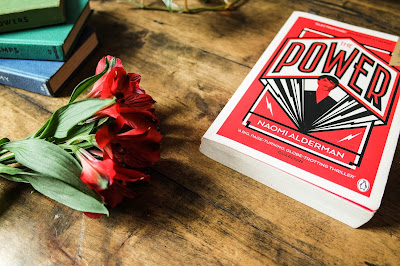Winner of the 2017 Baileys Women’s Prize for Fiction ‘The Power’ depicts a future where between the collar bones of teenage girls, a ‘skien’ awakens an electrical energy. The young girls awaken it in older women and with a slight touch all women can now shock, torture or kill another person. ‘The Power’ following four characters as this changes the way the world works.
Allie, an abused American foster child. Roxy, the daughter of a London crime family. Tunde, a Nigerian journalist and Margot, an American politician on the rise. These characters cross the globe and the power changes everything they’ve known. The wide geography of ‘The Power’ could have easily consumed the novel but these characters keep Alderman’s story grounded. This expansion across the globe reflects different cultures, religions, political, social and economic backgrounds. A world where gender expression aligns with power is perhaps not the principle of a better world. And it is through the four main characters that we the reader learn this.
As each character’s story develops we follow them through this historical change that they have found themselves in. I say historical as there is a framework that surrounds ‘The Power’ counting down in years towards a mysterious event. This frame is a discussion between two authors, Neil and Naomi as he desperately accepts intellectual property theft in order for this book to be published under a well known female author. This suggests that men still remain the weaker sex in the future but also adds a new perspective of how we read the novel.
As ‘The Power’ develops women who were brought up to instinctively be aware of their surroundings and of men have now got the chance to repel as men of the world struggle to come to terms with it. Yearnings for this new power are matched with the male struggle to understand it as internet forums and groups come together to violently vent their frustration and reduction in dominance. There is repeated talk of a cure, but if power was imbalanced before would genders ever become equal? As brutality persists and sexual violence that is horrific, public and graphic is committed it becomes clear that even after centuries of female victims ‘The Power’ is showing that women may not use this as a chance for an equal beginning. Across the globe women use it as a chance to be the dominant gender and avenge a lifetime of oppression whilst the rest of women witness the regression.
Despite all of this women still manage to become fetishised. Men that now fear women lust over their energy, desperate for a zap from the skien in sexual moments, as if no matter what happens to a woman her body is still a fixation and regardless of power the male gaze is still ingrained.
‘The Power’ does not hold any answers but theoretically explores what it can do to a person and if gender would make difference. For me before I picked up this novel I felt everything I read about it leaned towards a gender war rather than a power war. But I felt it explored more about the temptation of power, illuminating how people abuse it regardless of gender.











